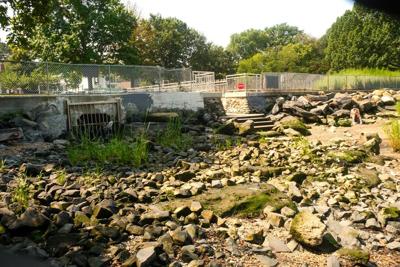Six years after plans were announced to extend a stormwater outfall pipe in College Point, the city Department of Environmental Protection said it is shifting gears.
The pipe at MacNeil Park Cove was set to be lengthened 200 feet beyond the shoreline to curb its threat to oysters and other sea life, the Chronicle reported in 2019. After its 2017 installation, the stormpipe decimated the oyster population and effectively undid a decade of restoration progress, resident and marine scientist James Cervino said.
“Imagine a big faucet at the beach where there’s beautiful grasses and oysters growing, let’s say, at low tide,” Cervino told the Chronicle via phone last Friday. “And this big giant firehose comes out of the side of the wall and just destroys everything by the velocity.”N
But the agency is discontinuing its previous plans to extend that pipe, a DEP spokesperson said Wednesday. Instead, it will pursue a plan to route stormwater west along Poppenhusen Avenue to a new outfall near 115th Street.
“This will avoid impacts to MacNeil Park’s trees, wetlands, and oyster habitats while enhancing neighborhood drainage with additional catch basins to mitigate flooding,” the DEP spokesperson said.
The existing pipeline was part of a larger infrastructure project to prevent flooding in College Point and reduce the pollution discharged into Flushing Bay and the upper East River.
Prior to the pipe’s installation, Cervino said, activists had pushed for one underground that would take contaminants away from the estuary to the deeper part of the bay, or one alongside a jetty that would not interfere with living habitats.
The force of the water from the existing pipe along with debris and contaminants killed the ecosystem, he said. Some oysters survived, but the destruction led to a mortality rate of 70 percent for them and mussels, and 50 percent for seagrass.
Years of advocacy followed the pipe’s completion, and the late City Councilman Paul Vallone announced the extension in 2019 upon hearing from the DEP. It was then in the design phase, and it was set to be built beneath the oyster reef.
Cervino said he thought the stormpipe was going to be extended last year, but he had seldom received updates from the DEP. He said he was simply “watching the destruction” in the interim.
“We’re waiting for them to start so that we can do our restoration from what they destroyed,” he said.
The DEP spokesperson said the decision to change the plan followed “extensive coordination” with stakeholders and other agencies.
But Cervino, who was unaware of the new plan before Wednesday, had concerns about it. If stormwater were to “spew” out of an opening like it has at MacNeil Park, it could create a sinkhole in the sand and destroy the ecosystem, he said. If a pipe is built out in a relatively small creek there, he continued, the stormwater could clog the estuary and cause an odor.
“It’s gonna be a pea soup, green, rotten egg-smelling, eutrophic creek,” he said. “It’s gonna be horrible. And those people that are gonna live there, they probably don’t even know what’s going on there.”
“However, if they build a pipe to extend the creek out to the direction of LaGuardia Airport, then that’s a pretty cool plan,” he continued.
The DEP did not mention specifics about the project.
Cervino and his wife, Kathryn, started cultivating reefs in College Point in 2004. They sought to improve marine life there by growing oysters and sea grass, upon receiving a permit from the state Department of Environmental Conservation.
Kathryn and James Cervino serve as president and vice president of the nonprofit Coastal Preservation Network, respectively. The latter also is a visiting scientist at Woods Hole Oceanographic Institution in Cape Cod, Mass., and he chairs Community Board 7’s Environmental Committee.
The CPN and other groups that funded the oyster and plant restoration, including the Global Coral Reef Alliance, lost an estimated $100,000 due to the destruction at MacNeil Park Cove, he said.
Asked if there are still plans to repair the damage at the site, the DEP spokesperson said the agency is still evaluating the existing outfall’s impact and assessing remedial measures.
“I don’t know who they’re protecting, but it’s not ecosystems,” Cervino said.
The DEC did not respond to inquiries ahead of press time as to whether a consent decree was issued, a legally enforceable document that aims to bring unpermitted activities into compliance.

